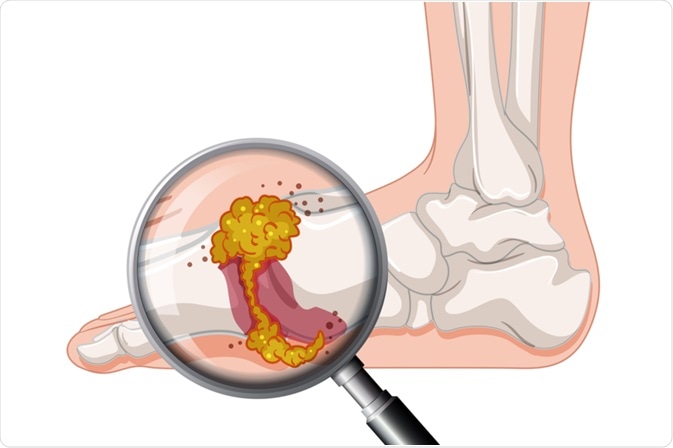Gout is a painful form of arthritis caused by a build-up of uric acid in the blood. Crystals of sodium urate accumulate inside and around joints causing severe joint pain and inflammation.

Image Credit: GraphicsRF.com / Shutterstock.com
What is uric acid?
Uric acid is the waste product formed when the body breaks down compounds called purines, which are found in proteins. These purines occur naturally in the body but are also found in many of the foods we consume.
Gout sufferers should avoid foods that are rich in purines such as meat, offal, oily fish, and mushrooms. Alcohol and fructose-sweetened foods can also increase uric acid levels and should therefore be avoided.
Many people manage to reduce their uric acid levels through a combination of medication, lifestyle changes, such as losing weight, and following a recommended diet.
Although a lower purine content in the diet may not cure gout, it can reduce the number and severity of gout attacks. A purine-rich diet, on the other hand, is associated with a five-fold increase in risk of these attacks occurring.
The gout diet
Some general dietary recommendations are given below:
Reduce meat, poultry and fish intake
Avoid animal foods rich in purines such as red meat, poultry, fatty fish, and seafood.
Limit saturated fats
Saturated fats limit the elimination of uric acid from the body. Therefore, eating plant-based proteins, such as pulses, legumes, and low-fat dairy products can help lower uric acid levels.
Eat complex carbohydrates
It is recommended that individuals with gout increase their intake of whole grains, fruit, and vegetables, as well as eat less refined carbohydrates like cakes and white bread.
Avoid fructose-sweetened foods
Consuming foods or drinks sweetened with fructose increases uric acid levels and the number of gout attacks. Sweetened condiments should also be avoided, as many manufacturers now use high-fructose corn syrup.
Gout Diet Dos & Don'ts
Food purine levels
Some examples of foods that are rich in purines and should be avoided include:
- Offal including liver, kidney, and heart
- Game meats such as rabbit and venison
- Seafoods such as shellfish, mussels, crab, and shrimp
- Oily fish such as herring, mackerel, anchovies, sardines, and trout
- Foods or supplements containing yeast, such as Marmite
Some foods with moderate purine levels include:
- Meats such as pork, lamb, beef, chicken, and duck
- Dried beans such as baked beans, soya beans, and kidney beans
- Mushrooms
- Quorn
- Wholegrains such as bran and wholemeal bread
Some examples of low-purine foods include:
- Dairy products such as milk, yoghurt, cheese, and butter
- Eggs
- Bread and cereals that are not whole grain
- Pasta
- Noodles
- Fruit and vegetables (refer to moderate purine list)
Although foods with a high purine content should be eaten with caution, people should remember that protein does form an essential part of the diet and is required for growth, development, and repair. Patients with gout are generally advised to include both animal and vegetable sources of protein in their diet. Research suggests that a diet rich in vegetable purines is significantly less likely to cause gout.
Other diet-related factors
Other lifestyle changes that patients with gout are encouraged to adopt include following a weight-loss plan, avoiding alcohol, and drinking plenty of fluids.
Weight loss
Being overweight can increase uric acid levels; therefore, gradual weight loss can significantly reduce the number of gout attacks. Weight loss will also reduce stress placed on joints such as the hips, ankles, and knees.
However, rapid weight loss should be avoided because it can actually trigger gout attacks due to the cellular breakdown that occurs. Weight loss should ideally be achieved through eating a healthy, balanced diet and engaging in regular physical activity.
Avoiding alcohol
Alcohol reduces the elimination of uric acid from the body. Beer, in particular, should be avoided, as it contains higher levels of purines than drinks such as spirits and wine. Beer also stimulates the production of uric acid in the liver.
People currently experiencing gout should avoid alcohol and those who have experienced gout in the past should limit their intake to around 1 or 2 units a day.
Drinking fluids
Drinking plenty of fluids, particularly water, can help remove uric acid from the body and prevent crystals from forming in the joints. Gout sufferers should aim to drink around 8 glasses of non-alcoholic fluids per day.
Outcomes
Patients with gout who follow the recommended dietary guidelines can significantly lower their uric acid levels and decrease the number and severity of gout attacks. Following such as diet and losing weight through exercise can also improve overall health and general wellbeing.
References
Further Reading
Last Updated: Feb 23, 2023